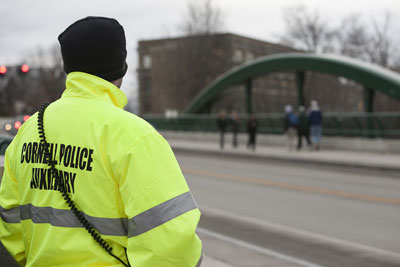Cornell mobilizes responders with message: Reach out, offer support, ask for help
By Lauren Gold

In response to three recent student deaths in the gorges around campus, the university has mobilized a host of outreach efforts, including augmented counseling services, regular checks in residence halls and an appeal to faculty, teaching assistants and supervisors to talk with students about maintaining perspective in stressful times.
Meanwhile, the monitors that have been posted on campus bridges will remain through the end of the week. Campus officials stressed that they are there to serve as a friendly presence for all students, and as a deterrent for anyone at immediate risk.
Restricting opportunity "is a key activity in a broader public health approach to suicide reduction," said Catherine Thrasher-Carroll, mental health promotion coordinator at Gannett Health Services. "Safety personnel are currently posted on the CU bridges to provide safety and reassurance to the Cornell community. Students, faculty and staff crossing the bridges are encouraged to engage in conversation with the bridge monitors and contribute their thoughts and suggestions on how reduce stress and promote emotional wellness on campus."
The administration is also directing Cornellians to a new Web site, http://caringcommunity.cornell.edu, providing news updates, contact information for campus services and a list of relevant upcoming events. Also available is Gannett's Notice and Respond Web site, http://www.gannett.cornell.edu/notice/index.cfm, offering guidance for students, faculty or staff who know someone in distress.
After presentations, the meeting will be devoted to a question-and-answer session. Contact Gary Stewart at 255-4666 or gjs28@cornell.edu for information.
At Gannett's Counseling and Psychological Services (CAPS), counselors are reaching out to students through secure e-mails and encouraging students to take advantage of the Let's Talk service, providing walk-in counseling at a variety of sites around campus. CAPS is considering extending its hours for the rest of the semester.
Gannett's Notice and Respond site is part of an aggressive mental health initiative launched last year to teach students, faculty and staff how to recognize and respond to a student in distress. That effort includes a Web site, faculty handbook and an interactive theater program, all to educate the community on how to recognize and respond to a student in distress.
Joseph Burke, director of residential programs, said residence hall staff members are checking in regularly with students in their rooms. "The residential staff have good, solid relationships with their residents, and we knew they would be able to respond in a personal way," he said. "Along with sending the message of care, we also wanted to remind students of the many resources available for them and their friends."
The university also is reaching out to students living off-campus. On Tuesday morning, leaders from the offices of Off-Campus Housing, Government and Community Relations and Fraternity and Sorority Affairs met with local landlords to discuss ways of providing more support to students in crisis. The group plans to send an e-mail to all Ithaca landlords in the coming days with information from Gannett's Notice and Respond program; they will also post fliers on doors in Collegetown and hold training workshops for landlords on March 24.
On March 14, students, faculty, staff and parents participated in a 50-minute CAPS live-stream discussion hosted by Tim Marchell, director of mental health initiatives, and Greg Eells, director of psychological services.
In response to an e-mail question, Eells said that despite the recent cluster of tragedies, the suicide rate in the larger population is not on the rise. For college students, the national suicide rate is one per 10,000 (half the rate for young adults of the same age who are not in college). Cornell's rate, he noted, is consistent with the national average.
To a concerned parent, Eells acknowledged that knowing how hard to push a child over grades is difficult. Instead of insisting students come home with a specific grade or GPA, he suggested that parents encourage their children to do the best they can with what they have.
If there is a heartening aspect to the tragedies, Marchell said, it is the way students have responded by coming together.
"We've received numerous e-mails with specific ideas and suggestions, but most importantly, students are saying, 'We are reaching out to one another. We are connecting with one another. ... We have a role to play in building this community and being with and for one another.'"
Susan Kelley contributed to this story.
Media Contact
Get Cornell news delivered right to your inbox.
Subscribe